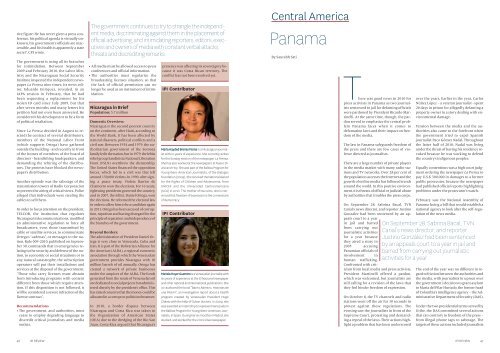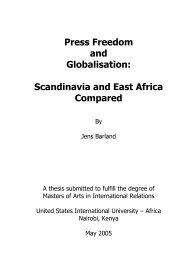FOCUS ON THE AMERICAS - International Press Institute
FOCUS ON THE AMERICAS - International Press Institute
FOCUS ON THE AMERICAS - International Press Institute
You also want an ePaper? Increase the reach of your titles
YUMPU automatically turns print PDFs into web optimized ePapers that Google loves.
tive figure: He has never given a press conference,<br />
his political agenda is virtually unknown,<br />
his government’s officials are inaccessible,<br />
and his health is apparently a state<br />
secret”, CPJ wrote.<br />
The government is using all its branches<br />
for intimidation. Between September<br />
2009 and February 2010, the Labor Ministry<br />
and the Nicaraguan Social Security<br />
<strong>Institute</strong> inspected the independent newspaper<br />
La Prensa nine times. Its news editor,<br />
Eduardo Enriquez, revealed, in an<br />
IAPA session in February, that he had<br />
been requesting a replacement for his<br />
stolen ID card since July 2009, but that<br />
after seven months and many letters his<br />
petition had not even been answered. He<br />
considered this development to be a form<br />
of political retaliation.<br />
Since La Prensa decided in August to rescind<br />
the contract of several distributors,<br />
members of the National Labor Front<br />
(which supports Ortega) have gathered<br />
outside the building - and recently in front<br />
of the homes of members of the board of<br />
directors - brandishing loudspeakers, and<br />
demanding the rehiring of the distributors.<br />
The protests have blocked the newspaper’s<br />
distribution.<br />
Another episode was the sabotage of the<br />
transmission towers of Radio Corporacion<br />
to prevent the airing of critical views. Police<br />
alleged that individuals were stealing the<br />
cables to sell them.<br />
In order to focus attention on the president,<br />
TELCOR, the institution that regulates<br />
Nicaragua’s telecommunications, modified<br />
an administrative regulation to force all<br />
broadcasters, even those transmitted by<br />
cable or satellite services, to communicate<br />
Ortega’s “cadenas”, or messages to the nation.<br />
Rule 009-2010, published on September<br />
30, commands that in emergencies relating<br />
to the security and defense of the nation,<br />
to economic or social situations or to<br />
any natural catastrophe, the subscription<br />
operators will put their installations and<br />
services at the disposal of the government.<br />
“Those who carry licenses must abstain<br />
from introducing programs with content<br />
different from those which require attention.<br />
If this disposition is not followed, it<br />
will be considered a severe infraction of the<br />
license contract”.<br />
Recommendations<br />
• The government, and authorities, must<br />
cease to employ degrading language to<br />
discredit critical journalists and media<br />
outlets.<br />
46 IPI REVIEW<br />
The government continues to try to strangle the independent<br />
media, discriminating against them in the placement of<br />
official advertising, and intimidating reporters, editors, executives<br />
and owners of media with constant verbal attacks,<br />
threats and discrediting remarks.<br />
• All media must be allowed access to press<br />
conferences and official information.<br />
• The authorities must regularize the<br />
broadcasting licenses situation, so that<br />
the lack of official permission can no<br />
longer be used as an instrument of intimidation.<br />
Nicaragua in Brief<br />
Population: 5.7 million<br />
Domestic Overview:<br />
Nicaragua is the second poorest country<br />
on the continent, after Haiti, according to<br />
the World Bank. It has been affected by<br />
natural disasters, political conflicts and a<br />
civil war. Between 1934 and 1979, the authoritarian<br />
government of the Somoza<br />
family led it the nation, but in 1979, the leftist<br />
rebel group Sandinista National Liberation<br />
Front (FSLN) overthrew the dictatorship.<br />
The United States financed the opposition<br />
forces, which led to a civil war that left<br />
around 150,000 victims. In 1990, after signing<br />
a peace treaty, Violeta Barrios de<br />
Chamorro won the elections. For 16 years,<br />
rightwing presidents governed the country,<br />
and in 2007, the leftist, Daniel Ortega, won<br />
the elections. He reformed the electoral law<br />
in order to allow him to be a candidate again<br />
in 2011. Ortega has been accused of corruption,<br />
nepotism and having disregard for the<br />
principle of separation and independence of<br />
the branches of the government.<br />
Beyond Borders:<br />
The administration of President Daniel Ortega<br />
is very close to Venezuela, Cuba and<br />
Iran. It is part of the Bolivarian Alliance for<br />
the Americas (ALBA), a regional economic<br />
association through which the Venezuelan<br />
government provides Nicaragua with 10<br />
million barrels of oil annually. Ortega has<br />
created a network of private businesses<br />
under the auspices of the ALBA. The funds<br />
generated from the resale of Venezuelan oil<br />
are dedicated to social projects but administered<br />
directly by the president’s office. This<br />
has raised concerns that the money could be<br />
allocated in a corrupt or politicized manner.<br />
In 2010, a border dispute between<br />
Nicaragua and Costa Rica was taken to<br />
the Organization of American States<br />
(OEA) due to the dredging of the Rio San<br />
Juan. Costa Rica argued that Nicaragua’s<br />
presence was affecting its sovereignty because<br />
it was Costa Rican territory. The<br />
conflict has not been resolved yet.<br />
IPI Contributor<br />
María Haydeé Brenes Flores is a Nicaraguan journalist<br />
with 10 years of experience. She currently writes<br />
for the Sunday section of the newspaper La Prensa.<br />
She has also worked at the newspapers El Nuevo Diario<br />
and Hoy. She was part of the Balboa Program for<br />
Young Ibero-American Journalists, of the Dialogos<br />
foundation (2009). She received the National Award<br />
for the Rights of Children and Adolescents, from<br />
UNICEF and the Universidad Centroamericana<br />
(UCA) in 2010. The mother of two sons, she is convinced<br />
that freedom of expression is the cornerstone<br />
of democracy.<br />
IPI Contributor<br />
Mariela Hoyer Guerrero is a Venezuelan journalist with<br />
six years of experience at the El Nacional newspaper<br />
and other national and international publications. She<br />
co-authored the book “Barrio Adentro, Historias de<br />
una Misión”, an investigative report about a health<br />
program created by Venezuelan President Hugo<br />
Chávez with the help of Cuban doctors. In 2009, she<br />
was awarded an internship to represent Venezuela in<br />
the Balboa Program for Young Ibero-American Journalists,<br />
in Spain. During her six months in Madrid, she<br />
studied, and worked for the Cinco Dias newspaper.<br />
Central America<br />
Panama<br />
By Saurabh Sati<br />
There was good news in 2010 for<br />
press activists in Panama as two journalists<br />
sentenced to jail for defaming officials<br />
were pardoned by President Ricardo Martinelli.<br />
At the same time, though, the pardon<br />
served to emphasize the central problem<br />
Panama faces when it comes to<br />
defamation laws and their impact on freedom<br />
of the media.<br />
The law in Panama safeguards freedom of<br />
the press and there are few cases of violence<br />
directed at journalists.<br />
There are a large number of private players<br />
in the media market with many radio stations<br />
and TV networks. Over 28 per cent of<br />
the population accesses the Internet and the<br />
growth of online media has followed trends<br />
around the world. In this positive environment,<br />
it is threats of official or judicial abuse<br />
by authorities that troubles the press corps.<br />
On September 28, Sabrina Bacal, TVN<br />
Canal’s news director, and reporter Justino<br />
González had been sentenced by an appeals<br />
court to a year<br />
in jail and barred<br />
from carrying out<br />
journalistic activities<br />
for a year because<br />
they aired a story in<br />
2005 accusing<br />
Panamian officials of<br />
involvement in<br />
human trafficking.<br />
Confronted with criticism<br />
from local media and press activists,<br />
President Martinelli offered a pardon,<br />
which was welcomed, but journalists are<br />
still calling for a revision of the laws that<br />
they feel hinder freedom of expression.<br />
On October 8, the TV channels and radio<br />
stations went off the air for 30 seconds in<br />
protest against these regulations. The<br />
evening saw the journalists in front of the<br />
Supreme Court, protesting and demanding<br />
a repeal of the laws. Their actions highlight<br />
a problem that has been underscored<br />
over the years. Earlier in the year, Carlos<br />
Núñez López – a veteran journalist –spent<br />
20 days in prison for allegedly defaming a<br />
property owner in a story dealing with environmental<br />
damage.<br />
Tension between the media and the authorities<br />
also came to the forefront when<br />
the government tried to expel Spanish<br />
journalist Paco Gómez Nadal. Throughout<br />
the latter half of 2010, Nadal was living<br />
under the threat of having his residency revoked<br />
because he was working to defend<br />
the country’s indigenous peoples.<br />
Equally contentious was a high court judgment<br />
ordering the newspaper La Prensa to<br />
pay U.S.$ 300,000 in damages to a former<br />
public prosecutor, because the newspaper<br />
had published official reports highlighting<br />
problems under the prosecutor’s watch.<br />
February saw the National Assembly of<br />
Panama facing a bill that would establish a<br />
national agency to look after the self-regulation<br />
of the news media.<br />
On September 28, Sabrina Bacal, TVN<br />
Canal’s news director, and reporter<br />
Justino González had been sentenced<br />
by an appeals court to a year in jail and<br />
barred from carrying out journalistic<br />
activities for a year.<br />
The end of the year was no different in regard<br />
to friction between the authorities and<br />
the media, with journalists in uproar over<br />
the government’s decision to grant asylum<br />
to María del Pilar Hurtado, the former head<br />
of Colombia’s intelligence agency – the Administrative<br />
Department of Security (DAS).<br />
Under the two presidential terms served by<br />
Uribe, the DAS committed several actions<br />
that ran contrary to freedom of the press –<br />
from illegal phone taps to sabotage. The<br />
targets of these actions included journalists<br />
IPI REVIEW<br />
47

















